
Christian Moueix & Ulysses
Sep 03, 2019
By Rob Griffin
Way back in the day, the classical Greeks were the best storytellers. For centuries Greek parents, as well as academy teachers, honed these native skills by handing down to younger generations ancient legends, often in the form of elaborate tales featuring bold characters under pressure, usually at the mercy of easily offended higher beings. Like all great oral traditions, these were intended to educate as well as entertain. Unlike many others, the ancient Greek myths had a higher purpose. They were crafted to explain life’s mysteries. All of them in fact! Everything from thunder and lightning to love and devotion had a God or a Goddess, and each one of these special beings not only represented something key but, as if in a celestial opera, they all played an active role governing the daily lives of mere mortals.
Today we still love great stories. Ironically perhaps, most have been told in one form or another for centuries—stretching back to ancient Greek times. One of the most well-known tales is that of Odysseus, the same guy the Romans call Ulysses, from the eponymous epic poem composed by the blind Poet, Homer.
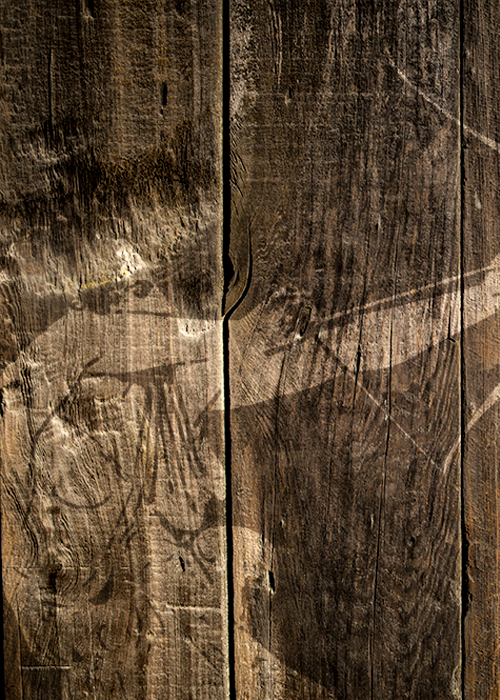
The Myth of Ulysses
Ulysses was the king of a small island Ithaca. His queen, Penelope, was renowned for her beauty. When Ulysses left to fight the Trojans, the couple was separated for 20 years. Ten of those years covered Ulysses’ return journey alone. His difficult road back provided the meat and potatoes of the tale because that’s where all the hero testing and adversity took place, not to mention where Ulysses encountered sea monsters, cyclops and giant lotus-eating birds, some with malevolent intent. But Ulysses was resolute and persevered, until ultimately he overcame every arduous trial and finally, after ten long-suffering years, found his way back home.
The whole story recycled 2,500 years later when a famous Irish author James Joyce wrote a book called Ulysses. Joyce condensed Ulysses’ odyssey into one frantic day but didn’t leave out any of the difficulties that confronted our hero (Leopold Bloom in the book) over the course of his epic ten-year sojourn.
Both Homer’s poem and Joyce’s book are backstories to another Ulysses story featuring our own modern-day heroic figure, the accomplished vigneron Christian Moueix. The parallels with Greek hero Ulysses are striking. Both figures are paragons of perseverance known for refusing to rest on laurels or take the easy way. An even more striking parallel—both continuously have met one monumental challenge after another and persevered.
Our Modern Day Homer: Christian Moueix
Christian needs no introduction, but I’ll offer one anyway. His father, Jean-Pierre Moueix, the founder of Château Pétrus was a one-of-a-kind renaissance man. He was a serious modern art collector as well as a relentless château buyer. His success in both pursuits was off the charts. For example, in 2008 the Moueix family sold a Francis Bacon work Jean-Pierre had bought originally from the artist for $86.3 million. It’s still a record for one painting. They’ve got plenty of other things like that in the family’s private art collection that took more than money to amass.
During the ‘50s and ‘60s, when he wasn’t busy buying famous original paintings, Jean-Pierre Moueix spent his time single-handedly making Pomerol the hottest commune in Bordeaux. He put together a diamond necklace of Château properties, all with top terroirs including Pétrus, Trotanoy, La Fleur Pétrus and in Saint-Émilion, Château Magdelaine.
Christian succeeded his father in the late ‘70s and never broke stride, adding to the family jewel box the Pomerol estates Château Hosanna and Château Providence followed by Château Bélair in Saint-Émilion (to ultimately merge with Château Magdelaine and form super Château Bélair-Monage).
In the early ‘80s, Christian discovered Napa Valley. Shortly after, in 1982, he bought a famous property and built a stunning winery that he named Dominus. Key to the deal was a vineyard called Napanook that originally had been part of an old ranch called Hopper.
Fast forward 25 years—Ulysses, AKA Christian, buys the rest of the old Hopper Ranch from Clark Swanson, whose kids showed no interest in the vineyards. This 40-acre purchase of vines adjacent and north of Napanook effectively put things back the way they had once been.

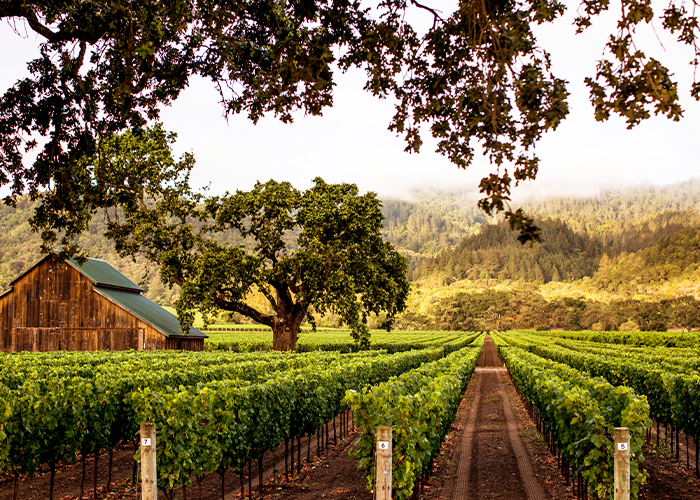
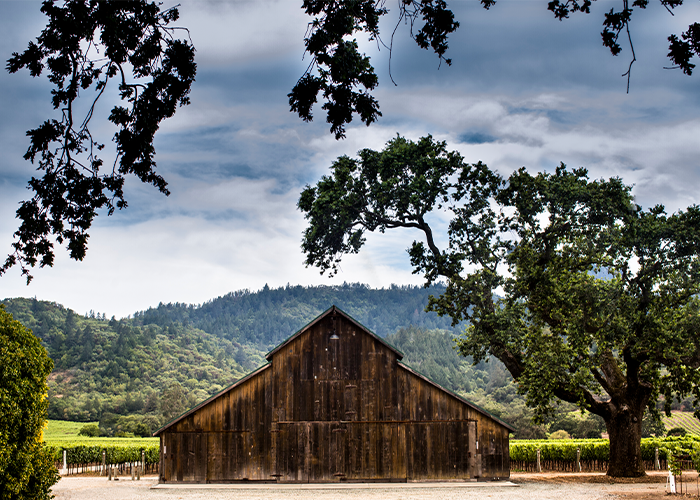
This is serious Cabernet country along the famed Oakville Bench under the protective but imposing shadow of the Mayacamas Range. Not surprisingly, the first thing Christian and his crew did was pull out all the old Swanson Merlot vines and replant the entire site to Cabernet Sauvignon, adding only a small amount of Cabernet Franc and Petit Verdot. Christian named the new vineyard Ulysses in recognition of his life’s long journey from the early days in sleepy Pomerol to his latest challenge in Oakville. He saw clear parallels between his long, steady path on the wine trail and Ulysses’ arduous journey home.
The soils in Ulysses are deep and gravelly, the perfect type for Bordeaux-born-and-bred Christian’s preferred method of sustainable, dry farming. Christian believes this is the best way to encourage deeper root penetration and ultimately capture not just greater terroir flavors, but a heightened sense of vineyard particularity, and thus, a singularity in his wine. He’s right about that and Ulysses is exactly that kind of wine—there’s only one!
Execution during harvest and in the winery both underscore the essential spirit of the Ulysses vineyard where interventions are minimal but observations never cease. Perfect ripeness is the mission and laser focus is the method. It starts with reduced yields and careful hand-harvesting of rigorously selected berries followed by painstaking table sorting. Processing takes place at Dominus and is guided by a gentle hand throughout fermentation in state-of-the-art vessels and maceration with gentle pump-overs (but not rough punch downs) before aging in oak barrels for 18 months, 40% of which are renewed every year.
Initial vintages were made, but it was not until 2012 that the first release was made available, so it’s still early days for Christian Moueix and Ulysses; but of striking note, rapid progress already has been made. Particularly notable to Christian and crew is the 2015 Ulysses vintage, a predominantly Cabernet Sauvignon blend with minor portions of both Cabernet Franc and Petit Verdot, that is now available via presell only with delivery scheduled for December this year. Unfortunately the production of the 2015 vintage, never intended to be robust anyway, is meager.
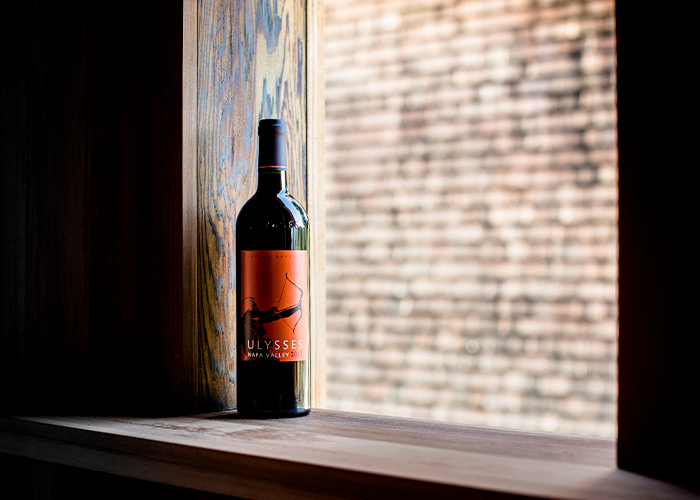
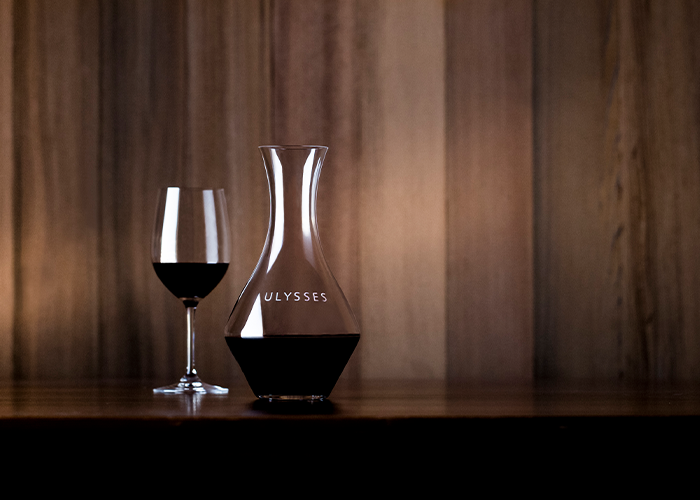
For Christian Moueix, Ulysses is the culmination of a long career in winemaking. In a lyrical sense, he’s come home at last to Penelope, where, as the story goes, she remained faithful for the entire 20 years Ulysses was missing, even when presented with a series of highly persuasive suitors. But just before Ulysses arrived home, and after such a long span of separation with no news, Penelope decided to settle the matter and finally presume her husband had perished and would never return. To choose a suitable successor, she purposely designed a contest of strength she knew no suitor could achieve. Until one day, in such a weary form that he was unrecognizable to his wife, the just-returned Ulysses stepped forward, performed the task of strength and once again won the heart of the beautiful and faithful Penelope.
It’s a great story and the heroes are almost interchangeable. With Ulysses, Christian Moueix has found his Penelope. His journey to Napa and his trip through a long career in winemaking have led him to a unique summit. Call it Mt. Penelope if you wish, but know this for sure—no bonafide red wine collection, either on a smart wine list, in a private cellar or on a choosy wine shelf in the physical or virtual world is complete without Ulysses.
Abbreviations and shortcuts notwithstanding, it’s the epics we hold on to and retell over and over. The Odyssey is that kind of story, and Christian’s Ulysses is that kind of wine. Both are epic expressions. Suddenly the bar has been raised… again. But like Homer’s classic song and Joyce’s famous novel or NASA’s more recently launched long journey Ulysses space mission, it’s all part of a great story. The best part—it’s not over. Cheers!
ULYSSES HITS THE MARK EACH VINTAGE

“Aromas of dark fruit, such as blackberries and black olives, as well as black tea and tanned leather. Raspberries and lemon spices, too. Full-bodied, very tight and polished with beautiful tannins and a weave of fruit and acidity to beautifully buttress the whole wine. Balanced and bright for the vintage.” – 96pts James Suckling
95pts Robert Parker; 95pts Jeb Dunnuck

Ulysses 2014, with its breadth of dimension and creamy texture, offers rich tobacco, ripe plum and fig aromas balanced beautifully by a long, supple finish.
98pts, Named #33 in Top 100 Napa & Sonoma Wines of 2017, James Suckling; 94pts Robert Parker

Ulysses 2013 delivers savory notes of woodland strawberries and jasmine. Luminous and tightly woven, the wine seizes the palate with grip and exuberance.
98pts, James Suckling; 96pts, Robert Parker; 96pts, Vinous

Ulysses 2012 is full of ripe red cherry, wild flowers and exceptional depth. Layers of spice notes and savory herbs add lift to the finish. A wine of great aging potential.
97pts, Named one of the Top 100 Reds Napa Valley, James Suckling; 93pts Robert Parker
